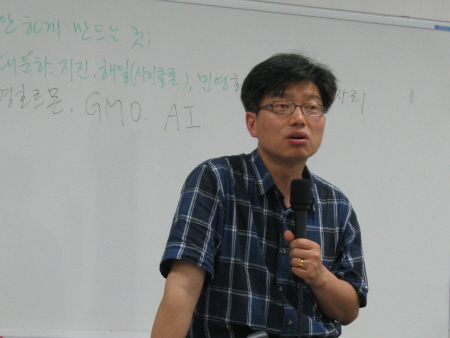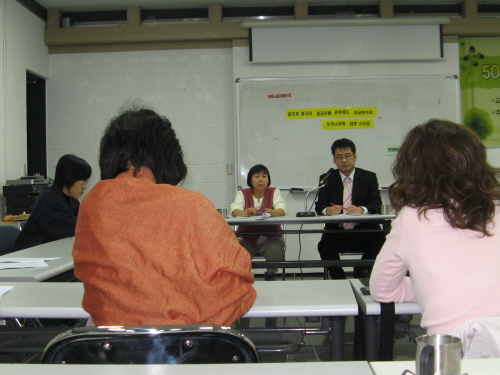"We will stop salts and enzymes. We will refuse taking emergency measures and being hospitalized."
HOT ISSUES & NOTICE 2008. 8. 31. 14:55"We will stop salts and enzymes. We will refuse taking emergency measures and being hospitalized."
<63 day hunger strike by Giryung Electronics workers. "This is only way we can carry out our struggles".>

"From now on, we will stop having salts and enzymes. We don't know how long we can stand, but we will continue until the moment when the Giryung Electronics will make a good decision for workers. Although we go down, we will refuse taking emergency measures and being hospitalized."
KIM Soyoun and YU Heunghee unionists on hunger strikes in the tent on the rooftop of the company refused interviews. But around 11am during a press conference, they sent a letter. As soon as participants looked at the letter, they were agitated and unsettled. That's because it showed their firm determination that they would stop having salts and enzymes, and further would refuse taking emergency measures and being hospitalized.
They also wrote "We are so sorry that we make you worrying. Last night when thunder stroke and a lot of rains fell, we discussed and found the only way to struggle is this." With the humble bow, all the participants knew what they meant.
LEE Sang-yun, a policy board member of the Korean Federation of Medical Groups for Health Rights (KFHR) stated that to stop having salts and enzymes mean "they have decided to die honorably. Medically, they cannot stand more than one day even in a normal case. At most, they can't stand more than 2~3 days." He also said "they have already lost over 20% out of their normal weights. They are already in great danger. Medically it is very difficult. Their minds over their bodies are standing." His voice was shaking while he was making a statement.
In addition, he said "Even medical practitioners cannot stop them from hurting themselves with their political consciences and wills. They through their weak bodies are facing against extreme savageness and irrationality of our society."
They have been carrying out struggles for 1085 days and been on 63 day hunger strikes. To help the long struggle that ordinary people cannot imagine, civil organizations came together and urged the company and the government to settle this matter. In front of Giryung Electronics, Gasan-dong, Seoul, at 10:30am on August 12, civil organizations including People’s Solidarity for Participatory Democracy (PSPD), Action, and Korean Federation of Medical Groups for Health Rights (KFHR) organized a press conference. They hung a placard at the back of the press conference showing 'Will you drive irregular Giryung workers to death?'
Around 50 unionists and civil organizations carried out picketing saying 'Workers are dying. Abolish irregular employment,' and 'Will you really drive irregular workers to death." to urge the company to make a good decision.
KIM Youngmin, secretary general of PSPD mentioned "I am so sorry I am very late. We will put our efforts to settle this matter. I feel the strong urgency that we should not let them die, and so I am here." and encouraged the unionists saying "Be alive and let's struggle together."
The company has insisted that there should be no place for striking unionists to work in because there are no production facilities including outsourcing. However, YOON Jonghee, a unionist said "our unionists confirm that a factory equipped with satellite radio production lines is in operation in Siheung city."
She also commented "We will bury the company's deception with our deaths. We want to live like humans. Abolish irregular employment and it can only stop our hunger strikes." and said "the company has repeated 'it will help us to find jobs in the other companies.' But if we simply needed jobs, we would not continue such a long struggle."
JO Youngsoon from Lawyers for Democratic Society said "I think democracy in Korea has died." and questioned "How can we tell democracy when workers receive only 640,000 Won?" He also highlighted "The Act on the Protection of Fixed-term and Part-time Employees is but to produce irregular employment not to protect irregular workers," and condemned the government and politics, saying "This matter related to Giryung Electronics' workers is a problem of ours and our future."
PARK Youngmi, a co-chairperson of Korean Women’s Associations United and KIM Hansung, chairperson of Korean Professors Union insisted "We should save workers in great danger, whose lives require prompt treatment." urging the company to "make sincere negotiations" and the government and the congress to "make active and fair arbitrations."
LEE Junghee, a congress woman belonging to the Democratic Labor Party and the people involved in the Seoul municipal partition of the party have also been on 9 day hunger strikes in support of them. Further, students belonging to the Hankiyeon plan to carry out co-hunger strikes near the City Hall and the Seoul Station.



